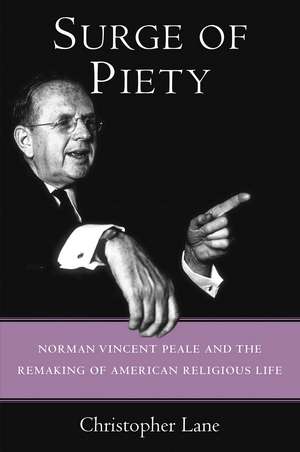Surge of Piety: Norman Vincent Peale and the Remaking of American Religious Life
Autor Christopher Laneen Limba Engleză Hardback – 15 noi 2016
The dramatic untold story of how Norman Vincent Peale and a handful of conservative allies fueled the massive rise of religiosity in the United States during the 1950s
Near the height of Cold War hysteria, when the threat of all-out nuclear war felt real and perilous, American minister Norman Vincent Peale published The Power of Positive Thinking. Selling millions of copies worldwide, the book offered a gospel of self-assurance in an age of mass anxiety.
Despite Peale’s success and his ties to powerful conservatives such as Dwight D. Eisenhower, J. Edgar Hoover, and Joseph McCarthy, the full story of his movement has never been told. Christopher Lane shows how the famed minister’s brand of Christian psychology inflamed the nation’s religious revival by promoting the concept that belief in God was essential to the health and harmony of all Americans. We learn in vivid detail how Peale and his powerful supporters orchestrated major changes in a nation newly defined as living “under God.” This blurring of the lines between religion and medicine would reshape religion as we know it in the twentieth and twenty-first centuries.
Near the height of Cold War hysteria, when the threat of all-out nuclear war felt real and perilous, American minister Norman Vincent Peale published The Power of Positive Thinking. Selling millions of copies worldwide, the book offered a gospel of self-assurance in an age of mass anxiety.
Despite Peale’s success and his ties to powerful conservatives such as Dwight D. Eisenhower, J. Edgar Hoover, and Joseph McCarthy, the full story of his movement has never been told. Christopher Lane shows how the famed minister’s brand of Christian psychology inflamed the nation’s religious revival by promoting the concept that belief in God was essential to the health and harmony of all Americans. We learn in vivid detail how Peale and his powerful supporters orchestrated major changes in a nation newly defined as living “under God.” This blurring of the lines between religion and medicine would reshape religion as we know it in the twentieth and twenty-first centuries.
Preț: 143.52 lei
Preț vechi: 174.38 lei
-18% Nou
Puncte Express: 215
Preț estimativ în valută:
27.46€ • 29.92$ • 23.14£
27.46€ • 29.92$ • 23.14£
Carte indisponibilă temporar
Doresc să fiu notificat când acest titlu va fi disponibil:
Se trimite...
Preluare comenzi: 021 569.72.76
Specificații
ISBN-13: 9780300203738
ISBN-10: 030020373X
Pagini: 224
Ilustrații: 12 b-w illus.
Dimensiuni: 140 x 210 x 19 mm
Greutate: 0.45 kg
Editura: Yale University Press
Colecția Yale University Press
ISBN-10: 030020373X
Pagini: 224
Ilustrații: 12 b-w illus.
Dimensiuni: 140 x 210 x 19 mm
Greutate: 0.45 kg
Editura: Yale University Press
Colecția Yale University Press
Recenzii
"Lane’s book will surely be requisite reading for historians who strive to give us a fuller perspective on the career and impact of this unusual American religionist."—Mitch Horowitz, Washington Post
"Surge of Piety contains some impressive archival research on Peale’s relationship with Blanton, and on Blanton’s relationship with Sigmund Freud."—Wall Street Journal
"Lane tells the story of Peale’s rise and fall crisply and without malice, even when Peale is at his more-huckster-than-minister gauchest."—Ray Olson, Booklist
"Lane has done impressive archival research on Peale. . . . [T]he book is thoughtful and makes for interesting reading."—Choice
"Carefully examining everything from Freudian psychology to traditional revivalism, Lane masterfully shows why we cannot make sense of the tremendous mid-century upsurge in American religiosity without understanding the inimitable Peale."—Matthew Avery Sutton, author of American Apocalypse: A History of Modern Evangelicalism
"Christopher Lane reveals a surprisingly understudied dimension of Eisenhower’s political consensus: the religio-psychiatry of Norman Vincent Peale. Lane’s is a fascinating and accessible reassessment of a pivotal political moment and the enduring fusion of popular religion and psychology in American life."—Darren Dochuk, University of Notre Dame
"In Surge of Piety, Christopher Lane ably shows the ways in which Norman Vincent Peale’s potent combination of Protestant Christianity, popular psychiatry, and nationalist politics helped remake America."—Kevin M. Kruse, author of One Nation Under God: How Corporate America Invented Christian America
"Surge of Piety contains some impressive archival research on Peale’s relationship with Blanton, and on Blanton’s relationship with Sigmund Freud."—Wall Street Journal
"Lane tells the story of Peale’s rise and fall crisply and without malice, even when Peale is at his more-huckster-than-minister gauchest."—Ray Olson, Booklist
"Lane has done impressive archival research on Peale. . . . [T]he book is thoughtful and makes for interesting reading."—Choice
"Carefully examining everything from Freudian psychology to traditional revivalism, Lane masterfully shows why we cannot make sense of the tremendous mid-century upsurge in American religiosity without understanding the inimitable Peale."—Matthew Avery Sutton, author of American Apocalypse: A History of Modern Evangelicalism
"Christopher Lane reveals a surprisingly understudied dimension of Eisenhower’s political consensus: the religio-psychiatry of Norman Vincent Peale. Lane’s is a fascinating and accessible reassessment of a pivotal political moment and the enduring fusion of popular religion and psychology in American life."—Darren Dochuk, University of Notre Dame
"In Surge of Piety, Christopher Lane ably shows the ways in which Norman Vincent Peale’s potent combination of Protestant Christianity, popular psychiatry, and nationalist politics helped remake America."—Kevin M. Kruse, author of One Nation Under God: How Corporate America Invented Christian America
Notă biografică
A professor of English at Northwestern University, Christopher Lane has received fellowships from the Guggenheim and Mellon Foundations. His writing has appeared in numerous national publications, including the New York Times. His books include Shyness and The Age of Doubt.
